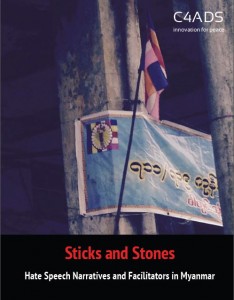Sticks and Stones: Hate Speech Narratives and Facilitators in Myanmar
By C4ADS • February 5, 2016 Conditions for Muslims have steadily declined in Myanmar, with the Rohingya Muslims of Rakhine State facing the gravest threat. In 2012, the country was rocked by the worst sectarian violence in over 50 years, resulting in over 200 killed and 140,000 displaced, most of them being the Rohingya. A 2015 study by the United States Holocaust Museum counted 19 early warning signs of genocide in Myanmar since the start of sectarian violence.1 Another study by the International State Crime Initiative concluded that the Rohingyas had already passed the
Conditions for Muslims have steadily declined in Myanmar, with the Rohingya Muslims of Rakhine State facing the gravest threat. In 2012, the country was rocked by the worst sectarian violence in over 50 years, resulting in over 200 killed and 140,000 displaced, most of them being the Rohingya. A 2015 study by the United States Holocaust Museum counted 19 early warning signs of genocide in Myanmar since the start of sectarian violence.1 Another study by the International State Crime Initiative concluded that the Rohingyas had already passed the
first four stages of genocide, including dehumanization and segregation and are now on the verge of mass annihilation.2 Anti-Muslim sentiment has grown so widespread that even Nobel
Peace Prize laureate Aung San Suu Kyi’s National League for Democracy (NLD) party declined to field a single Muslim among their 1,100 candidates for the November 2015 elections.
A campaign of hate speech that actively dehumanizes Muslims plays a key role in sustaining
violence across Myanmar. This is not limited to the Rohingya, and in fact, anti-Muslim
sentiment has evolved to the point that a range of anti-Muslim prejudices have now
normalized in mainstream Burmese discourse. A tense inter-faith atmosphere has resulted in
Muslim grievances finding an unreceptive ear even among many liberal and pro-democracy
activists, and small triggers rapidly escalating into mob violence. The most recent such
eruption was in Mandalay, Myanmar’s second-largest city, in July 2014, where a mob
destroyed several Muslim businesses, and resulted in the deaths of two people.
Download the full report here.
Tags: ASEAN, C4ADS, Crimes against humanity, Freedom of Religion, Human Rights, Muslims Rohingya, National League for Democracy, Race and Religion, Rakhine StateThis post is in: ASEAN, Crimes Against Humanity, Ethnic Nationalities, Human Rights, International Relations, Law, Military Regime, Women
Related PostsBurma Partnership Celebrates Continuing Regional Solidarity for Burma and Embraces the Work Ahead for Progressive Voice
Myanmar’s New Dawn :Opportunities for Aung San Suu Kyi and U.S.-Myanmar Relations
Expanding People’ Solidarity for a Just and Inclusive ASEAN Community
Civil society launches #FreeThe5KH campaign in support of the imprisoned ADHOC staff and NEC official
Myanmar logging ban a major step to forest sector reform









 All posts
All posts